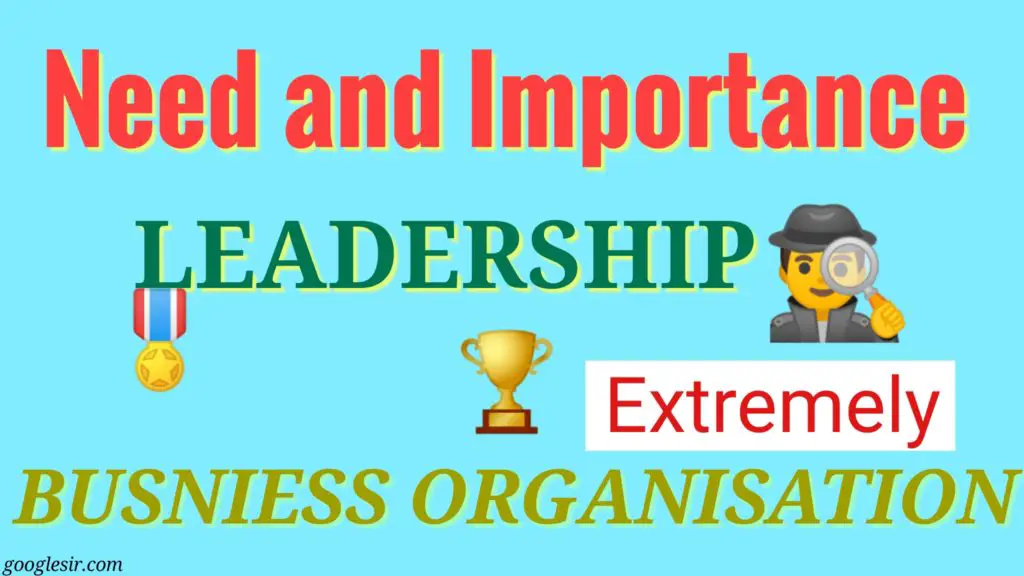Good leadership is essential to effective management in business. The Wheels of an organization do not go around themselves but must be prepared by leadership.
The leader is the fulcrum on which the needs of the organization and the demands of the individuals are balanced. More failures of business are attributable to poor leadership than to any other cause.

Poor leadership can nullify the soundest organization.
It is the quality of leadership that usually determines the fate of an organization.
What are the Needs of Leadership in Business?
The leader is the agent who helps smooth the pathway toward goal accomplishment.
There is no substitute for effective leadership.
The Need and Importance of Leadership are reflected in the following function:
1. Motivating Employees
A dynamic leader breathes life into the group and makes people eager to work towards the achievement of group goals.
He gives character to the group and sets the tone of the organization.
They will do it triggered by leadership and lukewarm desires for achievement are transformed into a burning passion for successful accomplishment through the skillful use of leadership.
Sound leadership creates an urge for accomplishment and transforms potential into performance.
A good leader improves the loyalty and commitment of employees toward the organization. The leader creates and maintains an environment conducive to high performance.
Motivating employees is not an easy task for everyone. It needs some motivating skills for the workforce.
Good leadership is itself a motivating force individuals which inspires people to hard work.
2. Creating Confidence
An effective leader creates and sustains self-confidence and enthusiasm among his followers.
He provides advice and guidance by which subordinates can recognize their qualities and capabilities.
A leader acts as a coach and Counsellor to his subordinates. He sets an example for others.
Leadership serves as an aid to formal authority in obtaining desired results from subordinates.
A good leader serves as a father figure and members gain strength and security by identifying emotionally with him.
3. Co-ordination
Leadership helps to unify individual efforts.
Leadership is the cohesive force that holds the group intact, The force that transforms into order, and the disciplinary power that keeps the group working towards the goal.
The electric current that energizes human action and the insight that converts despair into hope and changes half-hearted endeavor into Superior performance.
A good leader fosters mutual understanding and Team Spirit among his followers.
He creates a community of interest by harmonizing organizational goals and the individual interests of the subordinates.
He resolves internal conflicts by serving as arbitrator and mediator between the opposing factions.
4. Morale Building
Good leadership is indispensable To High employee morale. The leaders lift a man’s vision to higher sights.
He raises his performance and builds up his personality. He Shapes the thinking and attitudes of the group and maintains discipline.
Employee morales are a very important role in business growth. It’s building good communication among the workforce.
He develops good human relations and facilities interactions between the members of the group.
So, He maintains voluntary Cooperation and discipline among followers.
5. Facilitates Change
Leadership is the mechanism to convince people of the need for change.
Dynamic leadership is a comer stone of organizational change and development.
“In a world of change and uncertainty, The business leader becomes a vital element in the very process of change itself”
6. Goal Setting
A Leader provides guidance to the group by setting and interpreting the objectives to outline the operations of the organization he models the internal relations within the group.
7. Representation
A Leader is the Representative of his followers.
He serves as the personal embodiment of the group and as the true Guardian of its interest. He defends the integrity of the Group.
Thus, leadership leads to high performance. It serves as an aid to formal authority and determines the effectiveness of an organization.
It is the driving force for getting things done through others.

Leave a Reply